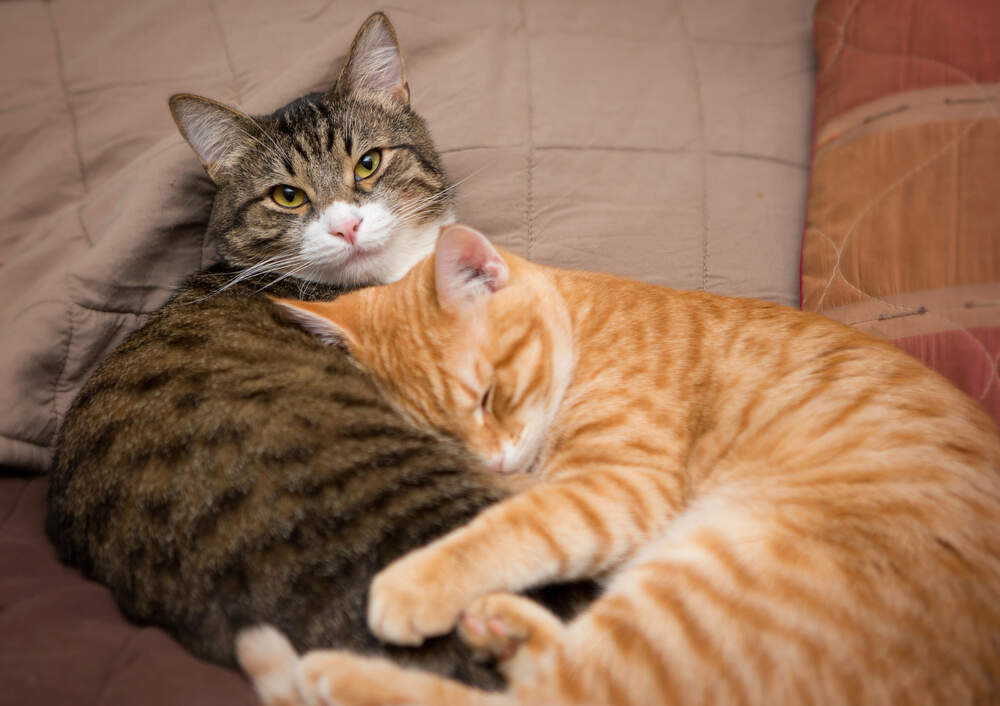multiple cats household

There are more cats as pets than ever before, and each family has more cats than ever before. People used to think that cats lived alone, but these days most people agree that some cats can get along with other cats. Whether cats will live together relies on the cat's personality, how it has interacted with other cats in the past, the home and neighborhood, and the number of resources the cats can use.
How do I bring a new cat into the house?
Slowly is the best way to get new cats to know each other. Mostly, cats can tell each other apart by their smell, and cats that live together share a scent. For this reason, it is important to make a group scent with all of your cats so that your present cat(s) will be more open to the new cat. Keep the cats away from each other and switch the old and new cats' beds so that they can get used to each other's smells. Food bowls can be used in the same way.
The next step is to let the cats see each other, but not touch, through a glass door or something similar. The cats should be praised and given food when they behave calmly around the other cat(s). Going back a step is necessary if at any point one of the cats acts scared or aggressive. If all the cats act calmly around each other, they can all be in the same room, which is another way to thank them for acting calmly. It is very important to take these steps slowly because the first meeting between cats often shows how they will get along in the long run.
How many litter boxes do I need if I have more than one cat? Where should I put them?
When cats share their litter box, they don't always like it, and they won't use one that is dirty, whether it was cleaned by them or another cat. Families with cats should generally have as many litter boxes as there are cats in the family plus one. For instance, if a place has two cats, there should be three litter boxes.
The litter boxes should not be put all in a row; they should be spread out. Cats should only use litter boxes in quiet places where they won't be bothered while they're going to the bathroom. However, if you are in a very quiet place, don't forget that the litter box is there; they need to be cleaned often.
What should I do if some of my cats aren't getting along anymore?
First, you would have to figure out which cats don't seem to be getting along. When there is a fight, writing down what happened can help you figure out who is involved. Keep cats that are fighting physically apart so that they don't fight again. After that, you should talk to your doctor. When one cat is being mean to the other cats, it could be because it is hurt or uncomfortable. Your vet should be able to help you find a behaviorist if the dog's violence isn't caused by a health problem.
Is there a magic number of cats that make everyone happy?
There is no ideal number of cats that can live together in peace. Some cats can only live alone, while others might be fine with living with more than one other cat. This depends on a lot of things, like how many litter boxes, resting areas, feeding and drinking areas, and other resources are in the home, how big the home is, and how good the space is (for example, cats don't have as many places to hide in open-plan homes), as well as how well the cat gets along with other cats (has it had good experiences with other cats in the past).
Is it better to have groups of people of the same gender or groups of people of different genders?
Cats that live outside tend to form groups with other female cats that are connected to them, like mothers, daughters, sisters, aunties, and so on, and their young, both male and female. Adult men are only found on the edges of these kinds of groups. Because of this, it is often suggested that homes with more than one cat should have two females (preferably related) and one male. But studies have shown that gender doesn't seem to affect how aggressive cats are toward each other in the same home.
What kind of cat should I get to get along with my other cats?
If you already have more than one cat and they are all getting along well, you should think about what benefits, if any, getting another cat would bring. There's always a chance that a new cat will make things less peaceful. If you are sure adding another cat is a good idea, it is usually easier to add a kitten than another older cat.
When I get home from work, I want to get a cat. Should I get two cats instead of one so they don't get lonely?
Getting two kittens shouldn't be a problem if you're thinking about getting them. They will likely play with and cuddle with each other. It is usually best to have two kittens from the same litter, but if that isn't possible, two kittens from different litters should be socialized and presented in the right way. You should make sure that the adult cats you are thinking about already live together happily. Rescue shelters often have adult pairs that have lived together before and are looking for new homes. It is not a good idea to choose two adult cats that you don't know because they are much more likely to not get along than if they have had good experiences with each other in the past.
Are there certain breeds that get along best?
It doesn't look like any breed is especially likely to be friendly. In reality, there is just as much difference in behavior within a breed as there is between breeds. More important is introducing cats to each other properly when they are young and still sensitive, as well as making sure they have enough space in their home.
Should cats eat together?
No, unfortunately not. Kittens can happily eat from the same spot and even the same bowl, but it's not a good idea for adults to keep doing this. Cats can fight if they feel threatened while they eat or if they think they have to compete for food. Having multiple feeding stations in different places (i.e., different rooms if possible) is the best way to handle feeding multiple cats at once. The same goes for drink bowls and places to rest. Make sure that each cat has at least one of these things.
Now that I have a new cat, one of my old cats is going to the bathroom inside. What's going on, and how can I stop it?
There are several reasons a cat might pee somewhere other than its litter box. The first thing that needs to be done is to figure out which cat or cats are using the litter box and whether they are peeing (most often a pool of urine on a flat surface) or spraying (most often on vertical surfaces at the base of the tail height, but can also drip down onto flat surfaces). The animal(s) should then be taken to the vet to be checked out to make sure it's not hurt by something medical. If the doctor can't find a medical reason, ask them to put you in touch with a behaviorist. Spraying or peeing could be caused by the new cat in a number of ways, such as fear of the new cat, feeling unsafe because of the new cat, or not having enough litter boxes. The problem could also have nothing to do with the new cat; it could have been caused by something else, and the time was just a coincidence. A behavior expert will help you figure out what's wrong and then work with you to make a plan to fix it.






